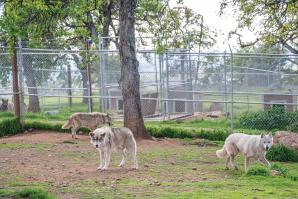This article is a sidebar to a feature story from our May issue.
I drive along a winding, one-lane country road in Placer County for quite a while, twisting and turning until it turns into a dirt path, then a gravel one, bumping along until I come to an open, sprawling area surrounded by oak trees. As I drive in, I’m greeted by a remarkable sight: 30 wolves and wolf dogs living together in spacious, high-fenced habitats, surrounded by nature. It’s the Women for Wolves animal sanctuary, formerly known as Jaws & Paws, which is a rescue for wolves and wolf dogs.
A young woman in hiking boots and long, flowing brown hair greets me with a big smile. It’s Anjali Ranadivé, an environmentalist, artist and R&B singer, who founded this sanctuary a decade ago. Ranadivé grew up with a nurse for a mother, Deborah Addicott, who also had a heart for animals, rescuing birds, squirrels and rabbits in their home. In college, Ranadivé earned her degree in marine science with a focus on conservation at UC Berkeley, where she learned about the wolf repopulation at Yellowstone National Park (see main story). She’s become an expert on the creature, rattling off their history and behavior patterns.
“The thing that just always blows me away is how family oriented they are,” says Ranadivé, former general manager of the Stockton Kings and daughter of Sacramento Kings owner Vivek Ranadivé. “Their relationships and their bonds run so deep, and they’re constantly interacting; they’re constantly playing.”
After college, she adopted a dog at a local Sacramento shelter, which, unknown to the shelter and herself, turned out to be a wolf dog — a wolf and dog crossbreed. She started hearing of more abandoned wolf dogs, many of which have to be euthanized for lack of a home or inability of the owner to care for them, and decided to start a rescue for them. Two of her latest arrivals here were two of the four wolf dogs that were recently roaming loose in Natomas for a month.
The wolves are strategically placed at the sanctuary in separate packs depending on behavior, background, and wolf content percentage.
There are five packs and several habitats as well as quarantine areas for new rescues to acclimate or recover from health issues. One pack has its own space with a female as leader; the newly rescued are in another; then there’s a habitat for the abused animals who are timid and skittish around humans. When the wolf dogs come to her (“I get a call at least once a week”), Ranadivé slowly builds trust by ensuring they have everything they need to thrive, including feedings, veterinarian care and walking them, and reassuring them they’re in a safe place.
Midway through our interview, we’re interrupted by the most incredible sound: the wolves, howling in harmony with each other. We stop talking and sit silently to take it in. It’s a beautiful, special moment.
“Isn’t that amazing? It literally makes me weak in the knees every time. It’s the best sound ever,” she says. “It’s the vocalizations they use to communicate. Their vocalizations are used to warn each other of danger or to communicate with lost pack members. It’s also a kind of get-together, a communal to bring them closer.”
Ranadivé has grown so close to the wolves that she sometimes spends the night with them in their dens when it’s warm. When she takes me and Comstock’s photographer Gabriel Teague into one of the pens, we’re both a bit apprehensive at first. The animals are large, especially with their thick winter fur, and frankly, they outnumber us. But Ranadivé tells us to sit down on the rocks at their eye level, and before long, some are curiously coming up to us. Each of them has a name.
One tan wolf named Aqua starts sniffing and gently nudging at my back with her snout and paw, then turns her friendly face for me to pet.
“She’s checking you out. That’s their way of greeting you,” Ranadivé says.
Many of the wolves are friendly, running around and playing canine tag with each other. There are others who hide in their wooden dens, reluctant to come out and see the humans. Each one has a role, be it a leader, healer, guard or nurturer of the pack. They vary in color, from light tan to charcoal to almost black. They get excited and howl when Ranadivé indicates she’s going to take some of them on a walk with leashes.
It’s mostly women who volunteer at Women for Wolves. Ranadivé believes women have a special connection with the animal. Several of her female volunteers in her program suffered from PTSD or have also been abused. Ranadivé says she had her own mental health challenges that were helped when she rescued her wolf dog Diamond.
It was her motivation for starting the sanctuary. She urges everyone to spend more time in nature.
“It’s like they need me, but I needed them. They saved my life. There’s a connection I can’t really put into words,” says Ranadivé.
With the rebrand, Women for Wolves will be offering programs for women like group therapy sessions and scholarships for students. Ranadivé has also talked to more than 30 children’s groups, educating them about wolves. She is planning seminars for California ranchers, flying in ranchers from Idaho who have found ways to make peace with wolves and protect their livestock.
“I think I want people to know that it’s really important to protect them,” she says of the wolves, noting they were here before us. “They’re literally ecosystem warriors. They’re protectors of nature.”
I bonded with Aqua, the golden wolf who befriended me, and all the other wolves, and I want to return soon after Women for Wolves moves to an even larger facility in El Dorado County. They always need help and donations because more people are breeding and abandoning wolf dogs, popularized by the “Game of Thrones” and “Twilight” franchises. Visit the Women for Wolves website for more information.
Get all the stories in our annual salute to women in leadership delivered to your inbox: Subscribe to the Comstock’s newsletter today.
Recommended For You

The Gray Wolf Was Once Thought to Be Extinct in California. Instead, It Has Made a Remarkable Comeback
Since OR-7, nicknamed Journey, made his fateful crossing, the California wolf population has grown to more than 70 since 2011. However, they remain listed under both the state and federal Endangered Species Act.

A Chapter Ends in Oakland While Another Begins in Sacramento
The Oakland Athletics play an emotional final game at the Coliseum before moving to Sutter Health Park
The Athletics’ final game at the Oakland Coliseum after a championship run of 57 years would be a significant event under any circumstance. But the bittersweet day on Sept. 26 took on an extra dimension for the Capital Region with the A’s scheduled move to West Sacramento.

Sacramento Kings Unveil New Arena Food
Offerings include Thai and Cajun, plus ‘Light the Beam’ themed drinks and desserts
As the Sacramento Kings get ready to kick off the NBA season Thursday night, the chefs at Golden 1 Center have been busy creating new food treats for fans.

Phil Oates Is a Strong Believer in God, Philanthropy, the Sacramento Kings and Candor
At 71, the commercial real estate tycoon continues to earn community-wide kudos — and straight A’s in college
Oates rarely does “the least” he can do. He is chairman of the board of the Buzz Oates Group — a $3 billion commercial real estate investment, management and development firm founded by his late father.

Five Years After the Shelter-in-Place Order, How Is Downtown Sacramento Doing?
Sacramento businesses face mixed results since first shutdowns associated with COVID-19 pandemic in March 2020
In the first year of the COVID-19 pandemic, Comstock’s followed four downtown Sacramento businesses and their broader sectors for a six-part series. On the fifth anniversary of the shutdowns, we checked in to see how they are faring.




